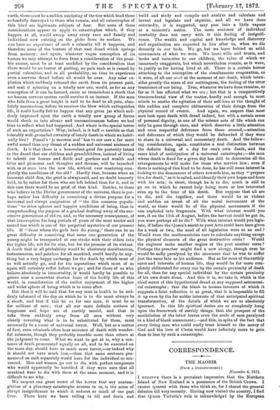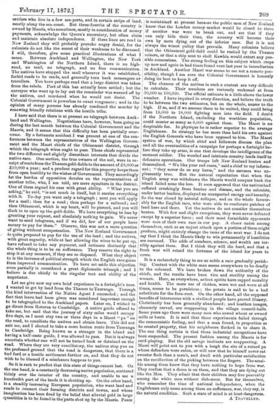CORRESPONDENCE.
THE MAORIS.
[Fsom I CORRESPONDKNT.]
November 6, 1871. I BELIEVE there is a prevalent impression that the Northern Island of New Zealand is a possession of the British Crown. I cannot quarrel with those who think so, for I shared the general delusion till very recently. Having now visited the country, I find that Queen Victoria's rule is acknowledged by the European
settlers who live in a few sea-ports, and in certain strips of land, mostly along the sea-coast. But three-fourths of the country is owned by Maoris, who sometimes, mostly in consideration of money payments, acknowledge the Queen's suzerainty, but often claim asd maintain absolute independence. If these lines are read in New Zealand they will probably provoke angry denial, for the colonist* do not like the secret of their weakness to be discussed.
1 will, therefore, give some practical illustrations of what I mean. Between Auckland and Wellington, the New York
and Washington of the Northern Island, there is no high- road, no mail, no telegraph, and no free communication. The natives have stopped the mail wherever it was established, forbid roads to be made, and generally turn back messengers or travellers. You have perhaps read that a large district was taken from the rebels. Part of this has actually been settled ; but the surveyor who went up to lay out the remainder was warned off by the natives, and murdered when he would not desist. The Colonial Government is powerless to exact vengeance ; and in the opinion of many persons has already condoned the murder by renewing friendly relations with the hostile tribe.
I have said that there is at present no telegraph between Auck- land and Wellington. Negotiations have, however, been going on
daring the last month between the Colonial Government and the Maoris, and it seems that this difficulty has been partially over- come. By a fortunate accident I was present at one of the con- ferences between the representatives of the Wellington Govern- ment and the Maori chiefs of the Ohinemuri district, through which the telegraph wires ought to pass. These chiefs represented the two different and slightly discordant interests that divide the native race. One section, the true owners of the soil, were in re- ceipt of rents from the Thames gold-fields to the amount of £8,000 or £10,000 a year; and a prudent regard for this property keeps them from open hostility to the wishes of Government. They accordingly let the burden of opposition devolve on the representatives of another tribe, who, I am told, are mere squatters in the district.
One of these argued his case with great ability. " What you are asking," he said, "is not much in itself, but it carries everything
with it. To-day you want only a telegraph ; next you will apply for a mail ; then for a road ; then perhaps for a railroad; and then Ohinemuri, which is my heart, will be pierced, and you will flock in to open up the gold-fields. We have everything to lose by granting your request, and absolutely nothing to gain. We never want to send telegrams, and if we did, few of our people have money to pay for them." Observe, this was not a mere question of giving without compensation. The New Zealand Government is quite prepared to pay for the use of the land ; and the natives, with great sagacity, while at last allowing the wires to be put up, have refused to take any payment, and intimate distinctly that the whole thing is to be on sufferance. They reserve the right to stop it at any moment, if they are so disposed. What they object
to is the increase of political strength which the English race gains from improved communication. To have set aside this objection oven partially is considered a great diplomatic triumph ; and I believe is due chiefly to the singular tact and ability of the
negotiator.
Let me give now my own brief experience in a fortnight's tour. wanted to get by land from the Thames to Tauranga. Through the kind intervention of the Native Agent I succeeded ; and the fact that leave had been given was considered important enough to be telegraphed to the Auckland papers. Later on, I wished to go direct from Rotorua to Cambridge. A native guide offered to take me, but said that the journey of sixty miles would occupy
five days, as I must stay two or three days in a Maori " pa " on the road, to conciliate the natives and obtain leave. This did not
suit me, and I elected to take a more beaten route from Tauranga to Cambridge. Being known as a stranger in the island and having a half-caste guide, I was allowed to pass. But it is always uncertain whether one will not be turned back or detained on the road. Where they are very conciliatory, the natives stop you on the professed ground that the road is dangerous, that there is a bad ford or a hostile settlement further on, and that they do not wish to be blamed if a mischance happens to you.
So it is rash to predict that this state of things cannot last. On the one hand, is a constantly decreasing native population, scattered thinly over the interior of the country, and unable to use a hundredth part of the lands it is shutting up. On the other hand, is a steadily increasing European population, who want land and roads to connect their farming districts and towns, and whose imagination has been fired by the belief that alluvial gold in large quantities is to be found in the:parts shut up by the Maoris. Peace is maintained at present because the public men of New Zealand know that the London money market would be closed to them if another war were to break out, and see that if they can only bide their time, the country will become their own by mere dying out of the inferior race. But it is not always the wisest policy that prevails. Many colonists believe that the Ohinemuri gold-field could be rushed by the Thames miners, or that a ship sent to shell Kawhia would extort any pos- sible concessions. The strong feeling on this subject which crops up now and again in bad times found vent last year in incendiarism in Auckland. Another Maori war seems to me not a remote pos- sibility, though I am sure the Colonial Government is honestly doing its best to keep it off.
The chances of the natives in such a contest are very difficult to calculate. Their numbers are variously reckoned at from 30,000 to 100,000. The official estimate is a little above the lower number. I have inquired in every direction, and believe the truth to be between the two estimates, but on the whole, nearer to the high. If so, and if we assume them to be united, they could bring from 15,000 to 18,000 fighting men into the field. I doubt if the Northern Island, excluding the worthless population, could muster as many as 6,000 against them. The Maori is no despicable foe. In physique he is rather superior to the average Englishman. In strategy he has more than held his own against the English Generals who have been opposed to him. The Maori system of war, by which chief and followers discuss the plan and all the eventualities of a campaign for perhaps a fortnight be- fore they take up arms, is one that develops the intelligence of the meanest soldier. The wooded and intricate country lends itself to defensive operations. Our troops left New Zealand beaten and demoralized. " We like your red•coats," said a chief to my inform- ant ; "they never do us any harm," and the sarcasm was un- pleasantly true. But the natural expectation that when the English army was withdrawn the Maoris would conquer back the island failed none the less. it soon appeared that the natives had suffered crushingly from famine and disease, and the colonists, under better leaders, displayed an unexpected energy and tenacity. So the war closed by natural collapse, and on the whole favour- ably for the English race, who were able to confiscate patches of land here and there. Yet the natives do not consider themselves beaten. With few and slight exceptions, they were never defeated except by a superior force ; and their most formidable opponents were men of their own race in our pay. A closer union among themselves, such as an unjust attack upon a portion of them might produce, might entirely change the issue of the next war. I do not say that I think the Maoris likely to win permanently if hostilities are resumed. The odds of numbers, science, and wealth are ter- ribly against them. But I think they will die hard, and that a fresh war will retard the fortunes of the island for years to come.
It is a melancholy thing to see so noble a race gradually perish- ing. Contact with the white man seems everywhere to be deadly to the coloured. We have broken down the authority of the chiefs, and the results have been vice and sterility among the women. Here, as everywhere, ardent spirits have sapped morality and health. The mere use of clothes, worn wet and worn at all times, seems to be pernicious ; the potato is said to be a bad substitute for the fern-root. On the other hand, all the supposed benefits of intercourse with a civilized people have proved illusory. Christianity has been generally abandoned ; and heathen images, obscenely carved, are reappearing in the village council-halls. Some years ago there were many men who sowed wheat or owned mills or boats. It is said that these experiments failed through the communistic feeling, and that a man found, in proportion as he created property, that his neighbours flocked in to share it. The one thing certain is that these industrial occupations have been suspended. The present fashion among the Maoris is for card-playing. But the old savage instincts are reappearing. A Maori will point out to you with a laugh the site of a ruined pa whose defenders were eaten, or will vow that he himself never eat sweeter flesh than a man's, and dwell with particular satisfaction on the recollection of the picking between the fingers. The sensi- ble among them know that they have nothing to hope from war.
They confess that a doom is on them, and that they are dying out like the Moa. They admit that their children may live peaceably among the white men without dishonour. But for themselves, who remember the time of national independence, when the Englishman only came among them on sufferance, war, they say, is the natural condition. Such a state of mind is at least dangerous.
A TRAVELLER.



































 Previous page
Previous page